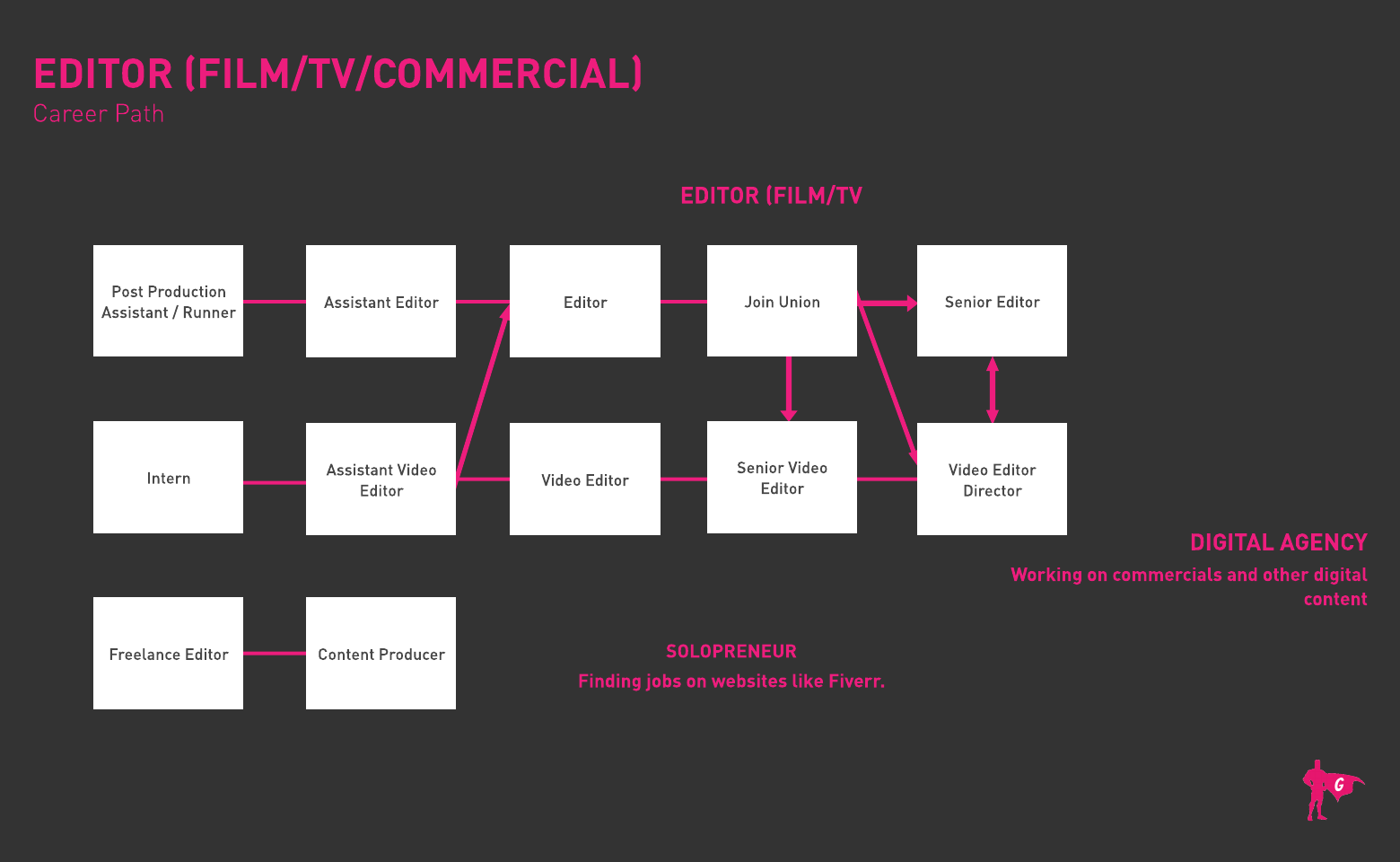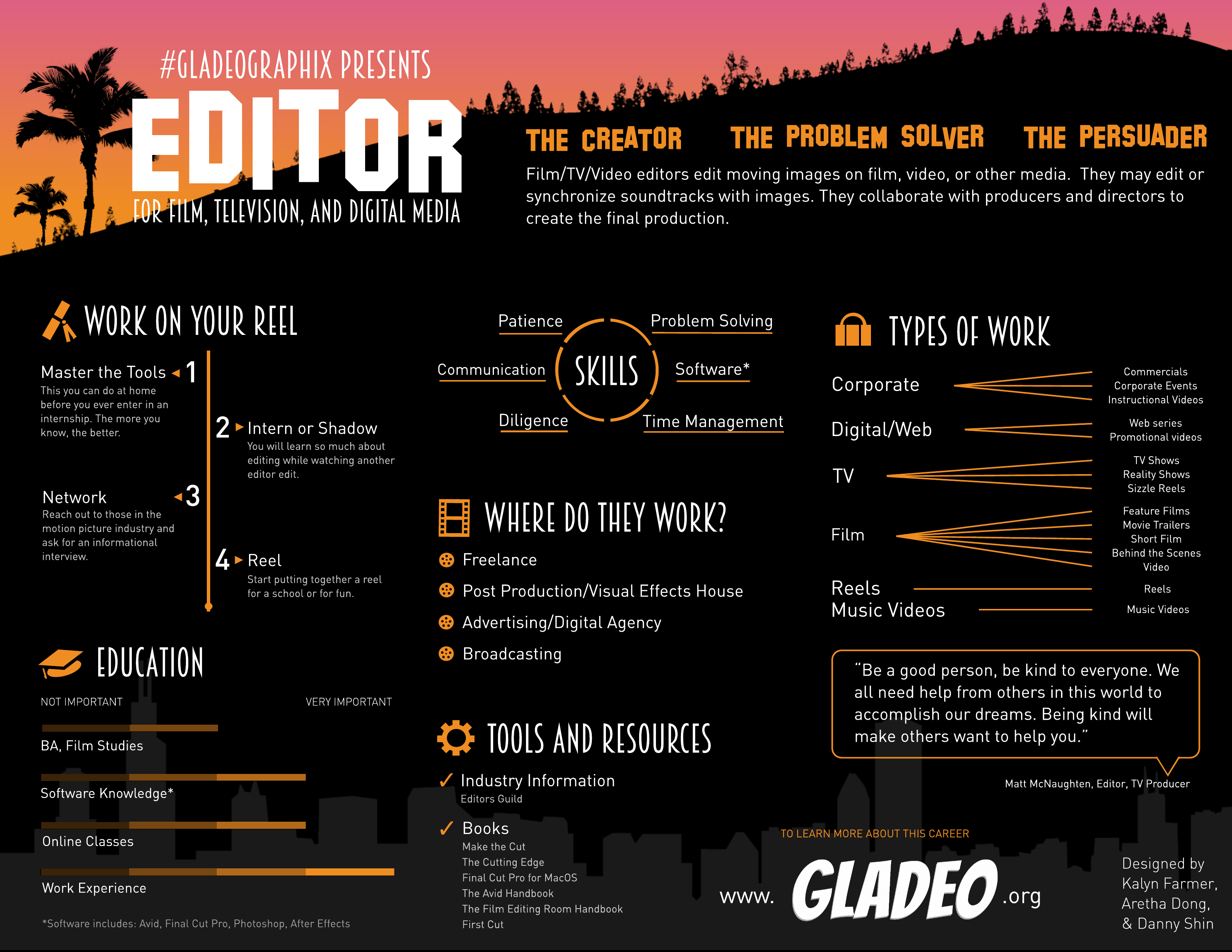Spotlights
Editor, Film Editor, News Editor, News Video Editor, News Videotape Editor, Non-Linear Editor, Online Editor, Tape Editor, Television News Video Editor, Video Editor
Film/TV/Video editors edit moving images on film, video, or other media. They may edit or synchronize soundtracks with images. They collaborate with producers and directors to create the final production.
Note: This profile is targeted to those who want to work in the motion picture industry in Los Angeles or New York City. It does not focus on being an editor in broadcasting.
- Always learning new things!
- Working with artist and creative folks!
“Editing TV and video is something I always wanted to do, and I did it for fun when I was a kid. So it's kinda like I get paid now to do something which has always been a hobby. So it's doesn't actually feel like work.” Matt McNaughten, Editor, TV Producer
- Technical: Avid, Final Cut Pro, Photoshop, After Effects
- Communication skills
- Time Management
- Problem solving
- Patience
- Diligence
- Freelance: Most editors in the motion picture industry are freelance and they work project to project.
- Post Production/Visual Effects House
- Advertising/Digital Agency
- Broadcasting: News outlets
- Film: Feature films, movie trailers, short film, behind the scenes video
- TV: TV shows, reality shows, sizzle reels
- Music videos
- Corporate: Commercials, corporate events, instructional videos
- Digital/Web: Web series, promotional videos
- Other: Actor reels
If your dream is to be a film editor, know that you will mostly likely not secure a film editing position right off the bat. Many editors do other jobs (corporate gigs, music videos, digital) to pay their bills and wait for their film editing opportunity. Unless you are a famous editor, the film and tv editing gigs are few and far between. Be flexible. The other gigs will allow you to hone your craft, prepare you for when you get the call to edit a feature film or television show and pay the bills.
- Long work days and irregular hours
- Difficult to break into the industry and stay in the industry: low pay when you start off.
- Working in a dark room for many hours alone
As videos online become more popular, there will be more work for editors in the digital space.
- Loved film and television!
- Loved editing videos: These days you can edit videos through free online software. Technology has come so far, almost anybody who has access to a computer can edit videos.
- Wanted to be part of the storytelling process!
- You were the go to person in your family to edit the family’s home video.
- Loved puzzles and games!
- $2,575.88 per week (Union)
- Film/TV/Digital Editors need a bachelor’s degree in Film and TV Studies or something similar. Some complete a Master of Fine Arts program but EXPERIENCE trumps education.
- OR take editing and film classes and major in another subject you are interested in. Editing is a creative process. The more experience and knowledge of the world you have, the more creative you will be, and the better of an editor you will be.
- Film Editors who work on small indie films have no formal educational requirements, but many also hold college degrees or attended formal training
- Film schools such as New York Film Academy offer short programs as well as full degree programs (see our list of Resources > Film Schools)
- Film/TV/Digital Editors should be familiar with popular editing software like Adobe Premiere Pro, Avid Media Composer, Final Cut Pro, DaVinci Resolve 17, Vegas Pro, Autodesk Maya, FUSION 17, The Foundry Nuke, Lightworks, ZBrush, Houdini, Boris FX Mocha Pro, Pixar’s RenderMan, Modo, and After Effects
- They must also have strong organizational and storytelling skills
- Many students gain practical experience through internships/apprenticeships in studios, small production companies, film councils, nonprofits, or production guilds and unions
- Additional ad hoc certifications can help bolster your credentials, such as UCLA Extension’s Film Editing cert
- Stock up on courses in art, English, writing, design, and photography
-
Join audiovisual clubs to get hands-on experience
Watch a variety of production types, including films, TV shows, commercials, etc., and pay attention to how scenes are edited and how visual storytelling elements work
Learn how to read and visualize stage directions in screenplays
Start editing your short films for YouTube or Vimeo. Look for friends and community members who want to join your projects!
- Master the tools!: This you can do at home before you ever enter in an internship. The more you know, the more you will impress.
- Primary software: Avid, Final Cut Pro
- Secondary software: Photoshop, After Effects
- Learn all the keyboard shortcuts. Know how to organize bins, work with multiclips, sync sound. You will need to know how to do this stuff later on when you become an assistant editor.
- Intern or shadow an editor: it will most likely be an unpaid internship but this experience is invaluable. You will learn so much about editing while watching another editor edit. You will not only learn the technical aspects but also more about the industry.
- Recommendation: choose a college/university that is near LA or NYC so that you can intern while you are in school or during the summers. The closer you are to those cities, the closer you are to people who can give you your first internship, break or gig.
- Edit videos for free at your high school, college, sorority/fraternity, non-profit, music video for your friend’s band…wherever you can.
- Reel: start putting together a reel.
- Advertise your video editing services in the local area or through online freelance platforms
- Attend film festivals and film school open events
- Keep honing your skills and reviewing changes in technology and techniques
- Try to make as many industry contacts as you can through constant networking
- Stick with it and keep applying for film editing internships until you land one!
- Study books, articles, and video tutorials on film and TV editing (see our list of Resources > Websites)
- Watch video interviews with seasoned film editors
- Work with independent filmmakers on smaller projects. Volunteer if they don’t have a budget to cover your salary!
- Join professional organizations to expand your network as you learn and build your reputation
- 9.6% with HSDiploma
- 8.5% with Associate’s
- 49.5% with Bachelor’s
- 6.1% with Master’s
- 0.7% with Professional
(% of employees aged 25 to 44 in the occupation whose highest level of educational attainment is)
- American Film Institute
- Boston University College of Communication
- Chapman University’s Dodge College of Film and Media Arts
- Columbia University School of the Arts
- Florida State University College of Motion Picture Arts
- Full Sail University
- LA Film School
- Loyola Marymount University School of Film and Television
- Motion Picture Institute of Michigan
- New York Film Academy
- NYU/Tisch School of the Arts
- San Diego State University School of Theater, Television and Film
- Seattle Film Institute
- UCLA School of Theater, Film and Television
- UCLA Extension - Entertainment Studies
- USC School of Cinematic Arts
- University of New Orleans Film and Theatre
- University of Texas at Austin Department of Radio-Television-Film

- Know your tools: Avid, Final Cut Pro, Photoshop, After Effects
- Reel: Put together a reel of things you have done. Don’t make it too long.
- Move to LA/NYC: This applies to those who want to work in the motion picture industry.
- Network
- Editors Lounge http://www.editorslounge.com/index.html
- LA Creative Pro User Group http://www.lafcpug.org/user_schedule.html
- LA Post Production Group http://www.lafcpug.org/user_schedule.htm
- Intern (usually un-paid): if you are not willing to work for free, this is not the career for you.
- Job boards: Reality Staff, Entertainment Careers, Mandy realitystaff.com, entertainmentcareers.net, and mandy.com.
- Internship programs: A.C.E. internship program http://ace-filmeditors.org/about-2/ace-intern-program/
- Ask a lot of questions but don’t be annoying.
- Have a servant-like attitude for your supervisor and be invaluable to him/her.
- Apply for a job at a post production facility or visual effects house.
- Be willing to start from the bottom: Meaning getting coffee, running errands is not beneath you. That is how the majority of people start in the industry. If this is something you are not willing to do, then don’t expect to work for major projects in Hollywood or NY. Stick to digital shorts, promotional, and industrial videos.
- Your first paying gig will most likely be a logger, runner or assistant editor and then you can work your way up.
- Endurance
- Perseverance: you will knock on many doors and get to no answers or rejections. Only the strong and persistent not only survive but break into the industry.
- Passion: like many careers in the entertainment industry, only those who are gung-ho about pursuing the careers survive.
- Ability to network and connect with people
- Willingness to move to LA or NYC.
- No entitlement complex: there are thousands of people who would do this job for free so don’t expect anything to be handed to you.
Almost all major motion pictures and scripted network TV shows require you to be a member of the Motion Picture Editors Guild in order to work on them. Thus, you will need to gain entry into the guild.
- Accumulate 100 paid days of non-union assistant editing work on projects that are similar in nature to union work. For more information, go to the Motion Picture Editors Guild website.
- Reality TV, Documentary Films, and Indie Features are your best bet for accumulating these days.
- Save all your pay stubs from these jobs and make sure the pay stubs say “Assistant Editor” on them.
- It takes between 5 and 10 years on average to go from non-union assistant to editor, so make sure you are committed.
Yes!
- Salary/Prestige: A big feature film directed by a big director would be an advancement over a smaller low budget film. Your salary will increase depending on the size of the budget.
- Become a TV Producer/Director: Many times editors go on to be producers or directors as well, if that is something an editor is interested in doing.
- Profit points: Some editors also negotiate profit "points" in films, which mean that depending on how well the film does at the box office, the editor will receive the negotiated compensation/percentage of profit.
Websites
- Academy of Motion Picture Arts & Sciences
- Academy of Television Arts & Sciences
- American Cinema Editors
- American Film Institute
- Association of Independent Video and Filmmakers
- Directors Guild of America
- EditFest
- Motion Picture Association
- Motion Picture Editors Guild
- Society for Cinema and Media Studies
Books
- Art of the Cut: Conversations with Film and TV Editors, by Steve Hullfish
- Cutting Rhythms: Intuitive Film Editing, by Karen Pearlman
- Film and Video Editing Theory: How Editing Creates Meaning, by Michael Frierson
- In the Blink of an Eye: A Perspective on Film Editing, by Walter Murch
- On Film Editing: An Introduction to the Art of Film Construction, by Edward Dmytryk
“Be willing to do anything. Learn how to do everything. Even if a job is tough and pays nothing, learn from it. If you know how to be an editor, you get editing jobs. But if you learn all aspects of the business, dabble in writing, producing, management, camera work, Photoshop, Final Cut Pro, After Effects, content creation, you will have a lot more prospects out there to bring in the money.”
“Be a good person, be kind to everyone. We all need help from others in this world to accomplish our dreams. Being kind will make others want to help you.” Matt McNaughten, Editor, TV Producer
Newsfeed

Featured Jobs

Online Courses and Tools









